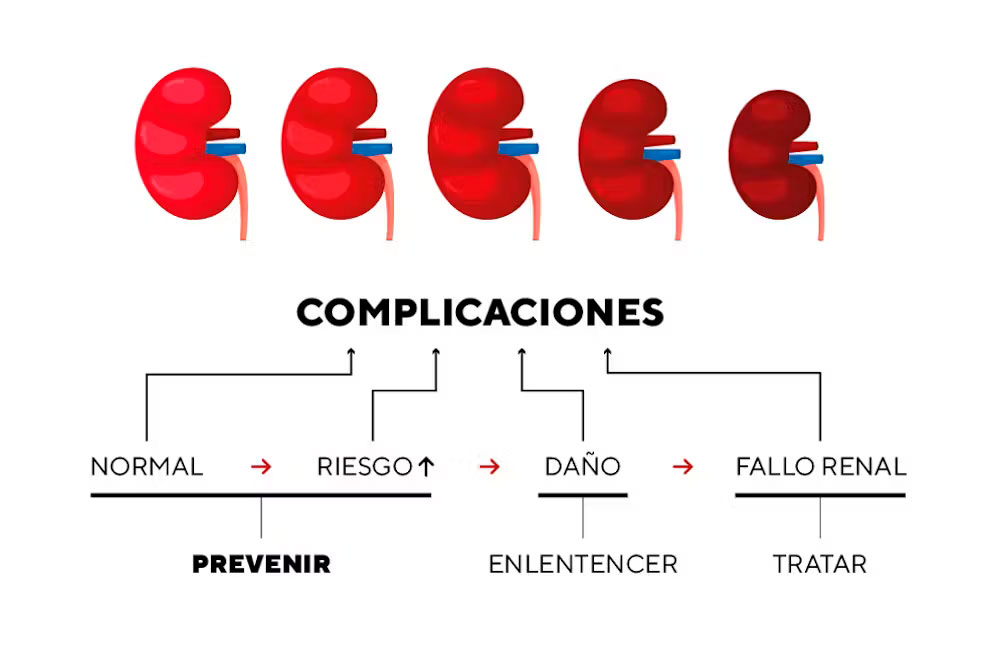15/03/2024
Published in
The Conversation
Nuria García Fernández Fernández
Medical specialist of the Nephrology Department of the Clínica Universidad de Navarra
Most people have two kidneys. Each of them is made up of perfectly coordinated machinery to eliminate, at all times and as needed, the water and waste substances produced by the living cells of our body. In this way they ensure that our blood has a normal composition at all times.
In a simple and straightforward way, we can imagine that they are strainers that let the "milk" (water and waste substances) through and prevent the "cream" (proteins and blood cells) from passing through.
When we say that a person has chronic kidney disease (CKD), what happens is that, at least during the last 3 months, his kidneys have had a damaged strainer: they do not let the "milk" pass through because there are obstructed holes or the "cream" escapes because some of them became too big.
This disease has stages ranging from initial or mild disease, to moderate, advanced and failure requiring dialysis. Often the fire starts small and gains strength until it burns the forest. That is why it is important to detect it early and treat it.

How do we know that our kidneys are sick?
In most cases, the symptoms of CKD usually appear when about 70-90% of kidney function has already been lost. These symptoms usually include high blood pressure, fatigue, fluid retention, foam in the urine... It is therefore advisable to investigate before it becomes more complicated.
In fact, it is called a "silent epidemic" because chronic kidney disease is so common. One in ten adults worldwide suffers from it, although many do not even know they have it. To make matters worse, it is on the rise with a forecast to reach 19% of the population by 2040, or nearly one in five adults.
Some situations that serve as an alert to review the function of this "strainer" are:
-
Be over 65 years of age.
-
Diabetes, hypertension, obesity or cardiac problems.
-
Chronic intake of anti-inflammatory drugs.
-
Having a family member with kidney disease in the family.
-
Being a smoker.
How can we check our kidneys?
Simply put, we must check the two functions of the "strainer": that it allows substances such as creatinine - a waste product of the body - to pass through and that it prevents proteins such as albumin from passing into the urine. Creatinine is measured in blood and albumin in urine.
With these two measurements we can confirm if the strainer has no clogged holes (if it removes creatinine well) and no holes that have become large (it does not leak or does not let albumin pass through).
The current healthcare system has the challenge to screen all patients at renal risk before it manifests itself.
What are the risks of chronic kidney disease?
While chronic kidney disease means that the kidneys get sick, the fact of not eliminating waste substances properly or losing albumin in urine, in addition to increasing the risk of having to undergo dialysis, increases the risk of suffering from other diseases. In particular, those of the heart and blood vessels, facilitating complications such as heart attack, heart failure, stroke or arrhythmias.
In fact, the World Health Organization recognizes CKD as the eighth leading cause of death in the world. By 2040, it could become the fifth and, by the end of the century, be closer to the first place, ahead of cancer.
On the other hand, this increased risk of other diseases is associated with a recognized disability for daily life, both professional and family, compared to those who do not have it.
Healthy lifestyle to take care of the kidneys
To maintain the health of our kidneys, it is essential to adopt a healthy lifestyle. This includes maintaining an adequate weight to avoid being overweight or obese, as well as committing to regular physical activity, with a minimum of 30 minutes a day or 210 minutes a week.
The per diem expenses plays a crucial role, prioritizing the Mediterranean diet leave in salt and avoiding the consumption of processed foods, high in sugars and fats.
It is also essential to maintain an adequate fluid intake, adapted to the climate and level of physical activity, with a recommended minimum of 1.5 liters of water daily. In addition, it is important to refrain from smoking and avoid self-medication. Specifically, anti-inflammatory drugs such as ibuprofen are particularly risky for the kidneys of certain people. It is always recommended to consult a physician before taking any medication and to avoid repeated consumption.
If we are diabetic or hypertensive, it is essential to regularly control our glucose and blood pressure. It is also important to check our kidneys if we have any of the risk factors mentioned above.
Treatments available
Those who already have chronic kidney disease should follow their regular medical check-ups. In addition, it is important to pay special attention to the advice mentioned above. For example, follow a per diem expenses leave in salt, with a maximum of 2 grams per day (equivalent to average small level teaspoon), avoid being overweight and follow the doctor's instructions regarding fluid and food intake.
It is also crucial to take the prescribed medication. In recent years, revolutionary drugs have been developed for the treatment of chronic kidney disease that can slow its progression. In many cases, they will even prevent advanced stages requiring dialysis.
